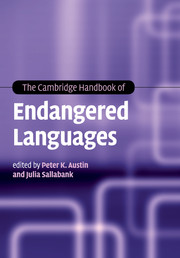Book contents
- The Cambridge Handbook of Endangered Languages
- Series page
- The Cambridge Handbook of Endangered Languages
- Copyright page
- Contents
- Figures
- Tables
- Contributors
- Acknowledgements
- 1 Introduction
- Part 1 Endangered languages
- Part II Language documentation
- Part III Responses
- Part IV Challenges
- References
- Index of language names
- Index
1 - Introduction
Published online by Cambridge University Press: 05 June 2012
- The Cambridge Handbook of Endangered Languages
- Series page
- The Cambridge Handbook of Endangered Languages
- Copyright page
- Contents
- Figures
- Tables
- Contributors
- Acknowledgements
- 1 Introduction
- Part 1 Endangered languages
- Part II Language documentation
- Part III Responses
- Part IV Challenges
- References
- Index of language names
- Index
Summary
- Type
- Chapter
- Information
- The Cambridge Handbook of Endangered Languages , pp. 1 - 24Publisher: Cambridge University PressPrint publication year: 2011
- 14
- Cited by

